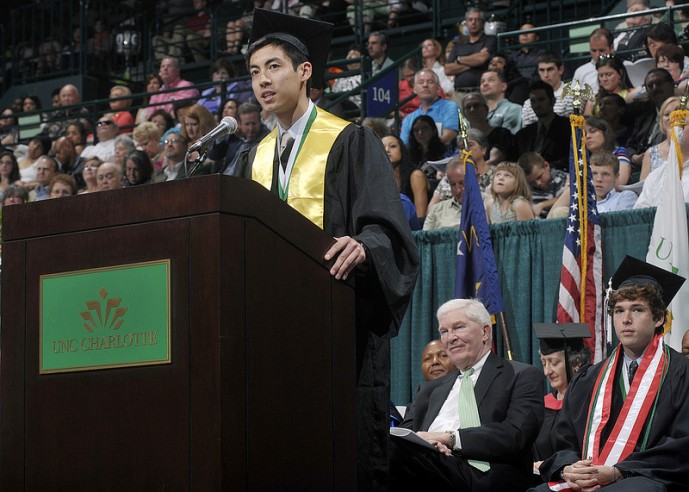In his work with The Chicago Council on Global Affairs, UNC Charlotte alumnus Andy Morimoto draws upon skills he honed at UNC Charlotte, as he works on a broad range of international, political, and economic issues.
Morimoto earned bachelor’s degrees in political science and history in 2013 from UNC Charlotte and his master’s degree in international relations from the University of Chicago. While at UNC Charlotte, he was a University Honors student and graduated summa cum laude with departmental honors in history.
Among his leadership roles with student organizations, he served as president of UNC Charlotte’s Model United Nations, and he was chosen to speak at Commencement. He was awarded the Fowler Scholarship for Political Science, the Sanford V. Davenport Scholarship for History, the UNC Charlotte Phi Kappa Phi Chapter’s Bonnie E. Cone Scholarship and received a 2013 National Phi Kappa Phi Fellowship.
Morimoto joined The Chicago Council as an intern while completing his master’s degree in January 2014, became a program coordinator six months later, and in March was named program officer. The Chicago Council is an independent, nonpartisan organization that is committed to educating the public—and influencing the public discourse—on global issues of the day. Morimoto also has independently published articles in The National Interest, The Diplomat, and The Fletcher Forum on Global Affairs.
Morimoto has shared insights into what he has accomplished since graduation.
Q: Can you please describe your work?
A: I currently work as a program officer at The Chicago Council on Global Affairs, an internationally-focused think tank dedicated to bringing Chicago’s ideas to the world, and the world’s ideas to Chicago. My job consists of three main duties. First, I work with a team to identify and recruit domestic and international government, civic, and academic leaders to come speak on the Council’s platform. Second, I help to produce an ongoing series of the Council’s Asia-Pacific and other public and corporate programs. And, third, I co-manage my department’s internship program. To be sure, the job involves many of the skills I learned while at UNC Charlotte – most notably, the ability to understand and communicate about a broad range of international, political, and economic issues.
Q: What has been the most fascinating or exciting part of your career?
A: The best part of my job is having the opportunity to interact and learn from world-class thought leaders on a daily basis. On any given week, we could have a New York Times columnist discussing international security, a panel of experts talking about the future of business in China, or a foreign head of state speaking on his or her country’s foreign policy. There’s an environment of constant learning at my job that I am very thankful for.
Q: How did your studies at UNC Charlotte prepare you for your graduate studies?
A: My studies at UNC Charlotte prepared me well for my graduate degree at the University of Chicago. As a political science and history major, I learned a lot about the different institutions, theories, and people that shaped the world. I learned how to think, write, and speak more clearly. All of this came in handy for my graduate studies in international relations. But more importantly, my time at UNC Charlotte – and more particularly, the professors who taught me – helped inspire me to continue learning, and to pursue the work that I am passionate about.
Q: How relevant would you say that the liberal arts and humanities are in today’s world and in what way?
A: I think that a liberal arts education is as relevant and necessary today as it’s ever been. At its core, a liberal education teaches students how to express themselves clearly and think creatively. These are skills that are important in every field, from international relations to medicine, and will continue to be important in the future.
Q: How has your involvement with Model UN come into play?
A: I’ve always said that my years on UNC Charlotte’s Model UN team were some of the most fun and formative of my life. In UNC Charlotte’s MUN, more than anywhere else, I found my voice and the confidence I needed to pursue a career in global affairs. I found an amazing group of teammates and lifelong friends. And I learned how to speak persuasively, which was perhaps most important, because I eventually needed to persuade a girl I met in Model UN to marry me.
Q: To what extent do you go about writing your publications? Have these publications been part of your organization or larger publication or study?
A: Whenever I write about international affairs, I try to identify and fill a hole in the national or international conversation. It certainly helps that my job is to facilitate these kinds of conversations; however, my writings have all been freelance and independent from the Council.
Q: What advice would you give to today’s students, as you look back?
A: Study abroad and become fluent in another language. It’s 100 percent true when they say that there’s no easier or better time to do these two things than when you’re in college.
Words: Michael Eccles, Student Communications Assistant, with Andy Morimoto
Image: Wade Bruton, UNC Charlotte University Photographer








